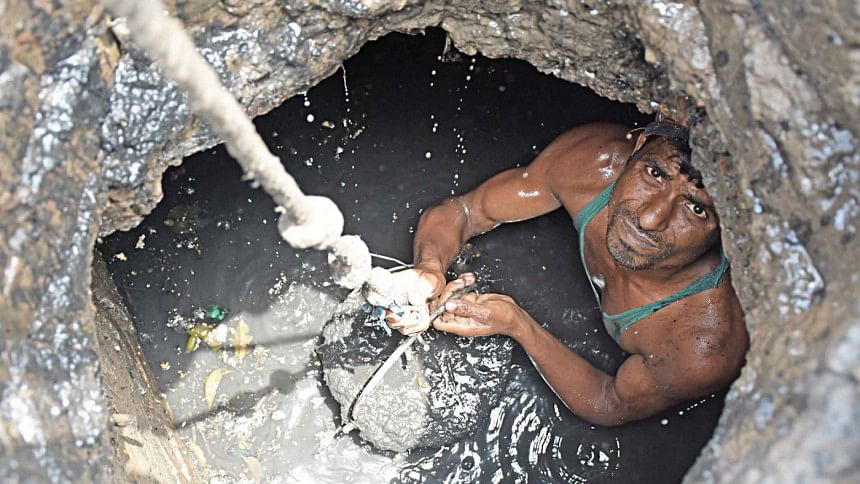They are called “untouchables”

26 years ago, a young Md Riajuddin came to Dhaka, from Mymensingh, to make a decent living.
After pulling rickshaws and selling vegetables, he then started working on excavating drains under a WASA contractor. Even then, nothing could bring any significant change to his life.
One time, the contractor asked him to clean clogged drains in exchange for a lucrative amount of money, which Riajuddin couldn't resist. However, he never knew he was going to make a career out of cleaning dirt and fecal waste.
"I agreed to do this because I could earn double the money by spending less time compared to my other jobs. Gradually, I got stuck into this, even though I knew I was heading towards an uncertain future, with health risks, vulnerabilities and shame," he said.
Today, Riajuddin lives in a rented room with his wife and two children at Dhalpur City Palli of the capital, which is home to more than 5,000 people like him. Currently, he cleans sewer lines, blocked toilets, and drains around six days a month and earns Tk 1000 per day, on average.
Compared to other conventional jobs, this has become a second job for many as the number of gigs has dropped.
Showing numerous wounds and cuts all over his arms and legs, Riajuddin said that they compromise their safety and risk their lives to ensure a clean city, even though they are shunned by society on a regular basis for what they do.
"During water logging in rain, we need to enter the manholes with sewage water up to our necks to unclog pipes, using sticks and often, bare hands, since the pipes inside are blocked with polythene, pieces of glasses, tins, wood, nails etc.
"We are not provided with any safety equipment or protective gear. Cuts, wounds, and the stink are regular things for us," he said.
According to Riajuddin, most of the time, the toxic gas inside the manholes and sewage water lead to breathing difficulties and chronic aches, for which, they need to take medicine.
"There have been numerous incidents where the sewer cleaners went inside the manhole and never returned. They died after inhaling the toxic gases inside," he added.
The story of 33-year-old sewer cleaner Md Rubel, resident of Bashpotti area in Dhalpur, is similar. Former waste-picker Rubel joined in cleaning drains and manholes as a teen, and according to him, aches, pain, and fever were common at the start.
"I can still remember, in the beginning, I faced intolerable itching, irritations, and week-long fever after cleaning a manhole or septic tank and took medicine for those," he said.
Showing a four-inch-long scar on his left leg, Rubel recalled, "One day, I developed this cut from a piece of brick, while cleaning a manhole. I remember it required 15 stitches and a week-long medical treatment, which cost around Tk 10,000."
"The contractor who appointed me for the work didn't pay a single penny for my treatment. Rather, my family had to borrow the money from others, which took us a whole year to repay," he added.
Rubel was so disappointed that he decided to leave the profession for good. "After a few days, however, I realised that if there is no food on the table, there is no point skipping work out of arrogance," he shared.
55-year-old sewer cleaner Palash Mia, who works as a designated cleaner for the Dhaka South City Corporation, said he hides the matter from his family.
"If the sewer cleaners strike and stop working for a week, the city dwellers won't be able to come out of their house. Although we ensure the cleanliness of the city, there is no assurance of hygiene practices or wellbeing of the sewer cleaners.
"Since society considers us 'untouchable', we are neglected everywhere, including in the hospitals and medicine stores," he said.
"This is why, almost everyone in our profession depend on kabiraj or medicine from dispensaries. If anyone in the hospital realizes who we are, they yell at us to stand far away," he said.
Renowned orthopedic surgeon Prof Dr Amjad Hossain stated sewer cleaners work in hazardous conditions as they come in contact with harmful objects while cleaning manholes or septic tanks, and that safety measures must be ensured.
Workers in such conditions can be subject to cuts, blood vessel injuries, nerve injuries, excessive bleeding, which can cause infections and lead to deformities, he said.
Prof Sultana Shahana Banu, head of the virology department at Dhaka Medical College, said, the dirt in manholes is filled with viruses and other microorganisms, posing severe health threats. This can cause itching, diarrhea, skin diseases, jaundice, and many other long-term health complications for the cleaners.
She also urged those who work in this sector to ensure proper protection from viruses and disinfect themselves while performing their duties.


 For all latest news, follow The Daily Star's Google News channel.
For all latest news, follow The Daily Star's Google News channel. 



Comments